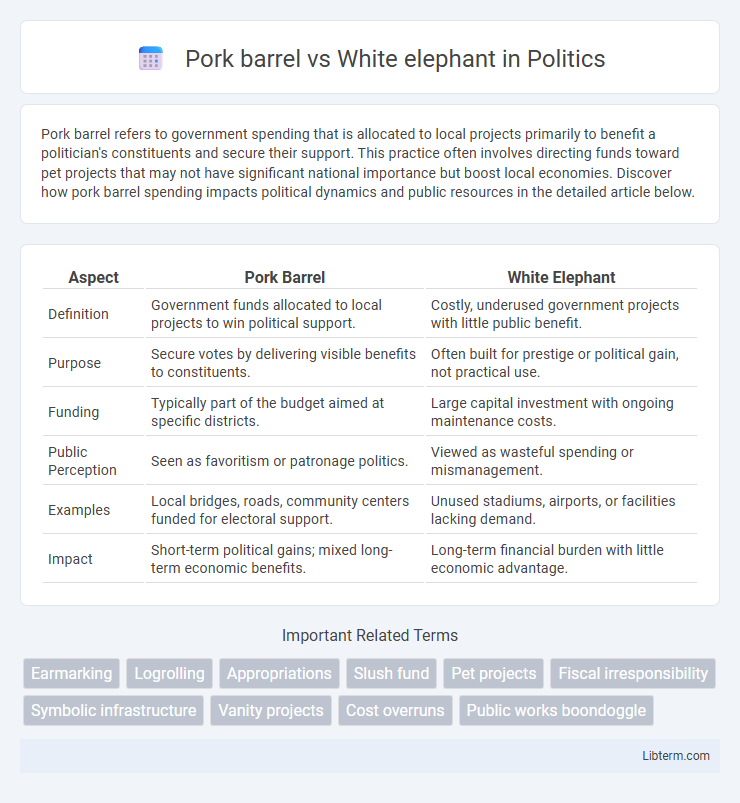Pork barrel refers to government spending that is allocated to local projects primarily to benefit a politician's constituents and secure their support. This practice often involves directing funds toward pet projects that may not have significant national importance but boost local economies. Discover how pork barrel spending impacts political dynamics and public resources in the detailed article below.
Table of Comparison
| Aspect | Pork Barrel | White Elephant |
|---|---|---|
| Definition | Government funds allocated to local projects to win political support. | Costly, underused government projects with little public benefit. |
| Purpose | Secure votes by delivering visible benefits to constituents. | Often built for prestige or political gain, not practical use. |
| Funding | Typically part of the budget aimed at specific districts. | Large capital investment with ongoing maintenance costs. |
| Public Perception | Seen as favoritism or patronage politics. | Viewed as wasteful spending or mismanagement. |
| Examples | Local bridges, roads, community centers funded for electoral support. | Unused stadiums, airports, or facilities lacking demand. |
| Impact | Short-term political gains; mixed long-term economic benefits. | Long-term financial burden with little economic advantage. |
Understanding Pork Barrel Projects
Pork barrel projects refer to government spending intended to benefit constituents of a politician in return for their political support, often characterized by localized infrastructure developments or public works that may not undergo rigorous cost-benefit analysis. These projects are typically criticized for promoting inefficiency and misallocation of public funds, contrasting with white elephant projects which are costly ventures with little practical use or value. Understanding pork barrel projects involves recognizing their role in political strategy, resource distribution, and the implications they have on transparency and fiscal responsibility within governance.
Defining White Elephant Projects
White elephant projects refer to costly public undertakings that fail to deliver proportional benefits, often becoming financial burdens due to poor planning or mismanagement. Unlike pork barrel spending, which channels funds to localized, politically motivated projects, white elephants are characterized by their excessive maintenance costs and limited practical utility. These projects drain resources without meaningful returns, undermining economic efficiency and public trust.
Origins and History of Pork Barrel Spending
Pork barrel spending originated in the early 19th century United States, referring to government appropriation projects designed to benefit local constituencies and secure political support. The term traces back to barrels of salted pork distributed to slaves, symbolizing politicians distributing government funds for localized projects. White elephant, contrastingly, refers to costly, burdensome projects with little practical value, originating from the historical Southeast Asian practice of gifting rare albino elephants that were expensive to maintain.
Characteristics of White Elephant Investments
White elephant investments are characterized by excessive costs, limited functionality, and little to no return on investment, often burdening organizations or governments with inefficient projects. These projects typically involve infrastructure or assets that are expensive to maintain, underutilized, and fail to address genuine needs or priorities. Unlike pork barrel spending, white elephants are marked by their persistent financial drain and inability to deliver significant public or economic benefits.
Political Motivations Behind Pork Barrel
Pork barrel projects are politically motivated funding allocations designed to benefit a specific legislator's constituency, often used to secure voter support and political loyalty. These projects typically involve government spending on local infrastructure or services that may not be economically efficient but serve electoral interests. In contrast, a white elephant refers to an expensive, underutilized investment that provides little practical value, often resulting from political incentives that prioritize visibility over utility.
Economic Consequences of White Elephant Projects
White elephant projects often result in massive economic inefficiencies due to their high maintenance costs and limited utility, burdening taxpayers and diverting public funds from essential services. Unlike pork barrel projects, which are typically designed to secure local political support, white elephant investments fail to generate proportional economic returns, leading to resource misallocation and stagnant regional development. Long-term fiscal sustainability is compromised as governments incur debt servicing expenses with minimal socioeconomic benefits from these underutilized infrastructures.
Comparing Cost-Benefit: Pork Barrel vs White Elephant
Pork barrel projects often yield localized benefits by directing government funds to specific districts, boosting infrastructure and employment with relatively clear short-term returns. In contrast, white elephant projects incur high costs with minimal practical value, burdening taxpayers and leading to underutilized or obsolete assets. Evaluating cost-benefit reveals pork barrel initiatives typically deliver tangible benefits to communities, whereas white elephant projects often represent inefficient allocation of public resources with poor economic outcomes.
Case Studies: Notable Examples Around the World
The Philippines' pork barrel scandal, involving the misuse of Priority Development Assistance Funds (PDAF), exemplifies the corruption risks associated with pork barrel politics and sparked nationwide protests demanding transparency. In contrast, Brazil's Brasilia National Stadium, initially built for the 2014 World Cup, illustrates a white elephant project due to its excessive construction costs and underutilization post-event. South Africa's 2010 FIFA World Cup stadiums showcase both phenomena, where significant infrastructure investments were marred by allegations of inflated contracts (pork barrel) and some stadiums remain unused (white elephants).
Identifying Red Flags in Public Infrastructure
Pork barrel projects often signal red flags in public infrastructure due to their focus on politically motivated, localized spending that lacks broader economic justification and transparency. White elephant projects highlight red flags through their excessive costs, underutilization, and failure to deliver anticipated public benefits, reflecting poor planning and misallocation of resources. Identifying these issues requires rigorous cost-benefit analyses, stakeholder scrutiny, and transparent reporting to prevent wasteful expenditure and enhance infrastructure effectiveness.
Strategies for Avoiding Wasteful Government Spending
Effective strategies for avoiding wasteful government spending focus on enhancing transparency and accountability to prevent pork barrel projects, which allocate funds for localized, often unnecessary, benefits. Implementing rigorous cost-benefit analyses and peer reviews helps identify and eliminate white elephant projects characterized by high costs and low utility. Encouraging public participation and leveraging data-driven decision-making ensure that funds are directed towards essential, impactful initiatives rather than politically motivated or impractical expenditures.
Pork barrel Infographic

 libterm.com
libterm.com